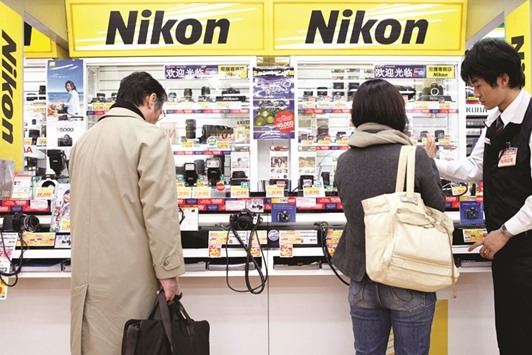Hedge funds have boosted their bearish bets on Japanese technology companies such as Nikon Corp and Casio Computer Co as the industry struggles to deliver the next killer product.
Technology companies account for eight of the 10 Japanese stocks that are most targeted by short sellers, who have collectively wagered ¥197.1bn ($1.7bn) that the shares will fall, according to data compiled by Bloomberg. Camera maker Nikon is the most-shorted stock. Oxford Asset Management, Vinva Investment Management and Stats Investment Management Co are among hedge funds that are wagering against Japanese tech stocks, according to filings with the Japan Exchange Group.
Two decades after Sony Corp launched the PlayStation and almost a decade after the iPhone ushered in a booming smartphone area, the bearish bets reflect pessimism about Japanese companies’ ability to come up with the next big thing.
While robotic automation, virtual reality and the so-called Internet of Things hold promise, there’s currently nothing that matches the smartphone’s potential, said Nicolas Baratte, Hong Kong- based regional head of technology research at CLSA Asia-Pacific Markets.
“In the next two years, something that can really create significant revenue growth for the whole sector indeed is very hard to find,” Baratte said.
The total market value of bets against the most-shorted technology companies has been rising, jumping by ¥14.2bn, or 7.8%, between Monday and Wednesday, according to data compiled by Bloomberg.
Even for smartphones, growth is cooling after a decade-long boom. Global sales of smartphone are set to increase 5% in 2016, slowing from growth of 28% in 2014 and 10% last year, according to Credit Suisse Group.
“Global growth of smartphones is seen as slowing down,” said Mitsuo Shimizu, equity strategist at Japan Asia Securities Group. “It’s possible that the short selling is related to that expectation.”
Nikon, a maker of cameras, lenses and precision equipment, is the most-targeted stock with 16% of its outstanding shares being shorted as of March 9, while Casio is fifth with 7.5%. Nikon, best known for its iconic cameras with a history going back almost a century, also makes lithography systems that are required in producing semiconductor and displays for smartphones.
Casio made the world’s first personal calculator in 1972, according to its website, and the company is known for popularising electronic watches in the 1970s and 1980s.
Hedge funds were shorting about 6.7% of the outstanding shares of Sharp Corp, which is close to signing a $6bn takeover agreement with Foxconn Technology Group. Sharp has been losing money for years and its need for financial support set off a takeover battle last year between Foxconn and the government-backed Innovation Network Corp of Japan.
Short sellers borrow stocks they believe will decline to sell them with the hope of repurchasing the securities later at a lower price and pocketing the difference. Representatives for Oxford, Vinva and Stats declined to comment on their short positions, as did spokesmen at Nikon, Casio and Sharp. Not all the bets have gone in favour of short sellers. Nikon’ stock is up 7.8% this year, as net income for the third quarter increased more than analysts had estimated. Casio has dropped 23% in the period. Its third-quarter operating profit of ¥11.8bn missed analyst estimates.
Shares of Nikon rose 1% and Casio gained 1.4% in Tokyo yesterday. KLab, a mobile content provider, fell 0.7%.
Nikon is trading at 30 times earnings and Casio’s price-to-earnings ratio is at 17 times, compared with a median of 19 times for their peers. Three out of 15 analysts who cover Nikon have a sell rating on the company, while only one of 11 analysts covering Casio has a similarly bearish view.
Japanese companies were Asia’s best-performing technology stocks in 2015, led by online gaming companies and software companies.
This year, the Topix Electric Appliances Index has fallen 14%. Still, the sector index is trading at a price-to-earnings ratio of 24 times, higher than 15 times for the Topix.

Customers browse Nikon cameras at a store in Tokyo. Nikon is the most-targeted stock with 16% of its outstanding shares being shorted as of March 9.
